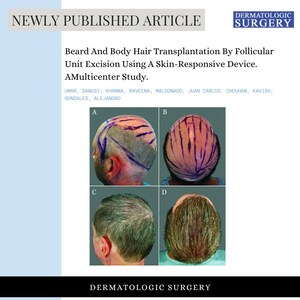A Novel Surgical Technique Brings New Hope to Folliculitis Decalvans Patients
LOS ANGELES, Sept. 11, 2023 /PRNewswire/ -- Researchers at Dr. U Hair and Skin Clinic in Los Angeles report significant milestones in treating the challenging scarring hair loss condition known as folliculitis decalvans. A novel high-tension suture guard offers affected patients a promising alternative to conventional methods. The study outcome was published under "Refractory folliculitis decalvans treatment success with a novel surgical excision approach using guarded high-tension sutures." in the Clinical Cosmetic and Investigational Dermatology Journal.
Folliculitis decalvans (FD) causes chronic inflammation scarring with symptoms of pain, itch, discharge, and social debilitation, mainly in middle-aged individuals. Conventional treatments—extended steroid, isotretinoin, antibiotic use—carry substantial side effects, rendering continuous use impractical. Unfortunately, these options bring temporary relief and often prompt swift disease return post-treatment, frustrating patients and professionals. Motivated by the lack of solutions, Dr. Umar sought innovative alternatives.
The publication reported five FD patients, including four men and one woman, who had failed various conventional treatments. Remarkably, all patients experienced complete remission, with no instances of disease recurrence noted during the 10–24-month follow-up period.
Lead author Dr. Sanusi Umar of Dr. U Hair and Skin Clinic and head of Harbor-UCLA's scalp and hair disorders division expresses enthusiasm for their successful surgical approach. Integrating excision and innovative suturing techniques holds promising potential for sustained FD remission. Utilizing a patented high-tension suture guard (Athena Suture Guards® - Dr. U Devices Inc, Manhattan Beach, CA) to guide wound contraction and minimize tissue damage was pivotal. Dr. Umar highlights the remarkable success of combining this with second-intention healing, offering newfound relief for long-struggling folliculitis decalvans patients.
Dr. Umar reiterated the necessity of broader research to validate their approach. "While our case series offers promising insights, further validation through larger controlled studies is essential to establish the effectiveness of our technique," he emphasized. The team's enthusiasm for the potential of this technique to enhance the quality of life for individuals grappling with stubborn folliculitis decalvans lesions is palpable.
The resounding success of this study marks a significant stride in comprehending and addressing FD and rekindles hope for individuals burdened by its debilitating effects.
For media inquiries, please contact:
Sara Harutyunyan
Dr. U Hair and Skin Clinic
[email protected]
SOURCE Dr. U Hair and Skin Clinic

WANT YOUR COMPANY'S NEWS FEATURED ON PRNEWSWIRE.COM?
Newsrooms &
Influencers
Digital Media
Outlets
Journalists
Opted In





Share this article